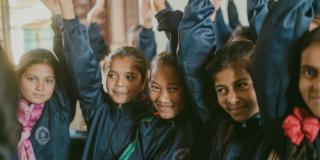
The people of Nepal are resilient. They have to be: Nepal is in one of the most beautiful, and yet most deadly parts of the word.
James Russel is an education volunteer on the Sisters for Sisters' Education project. He explains how the concept of 'resilience' is at the heart of the programme:
You need to be tough and adaptable to survive thanks to Nepal’s terrain, a turbulent political history and a vulnerability to economic crisis. Hundreds of years of surviving has fostered a special kind of resilience.
I am constantly reminded how education has persisted despite great challenges.
Nepal’s schools exemplify this. Visiting schools in Surkhet and talking to colleagues from around Nepal I am constantly reminded how education has persisted despite great challenges. The 2015 earthquake destroyed or damaged 9000 schools; during the civil war teachers braved huge threats to continue their work in rural areas; and every year floods and landslides prevent thousands of Nepali children from getting to school and receiving their education.
Despite these historical and present-day challenges, Nepali education has continued.
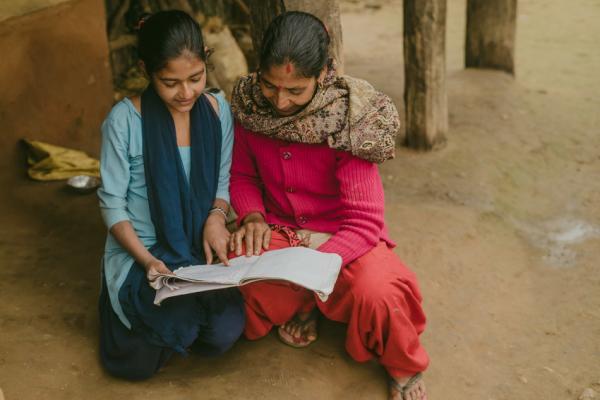
When we talk about building resilience people’s minds often turn straight to disaster relief, but in fact it is so much more than that. Resilience is about a system coping with stresses, learning from stress and developing itself to become better at coping with future stress. In that sense social resilience is much more a development issue than a disaster and humanitarian aid issue. Disaster and humanitarian aid start when resilience fails.
Sisters for Sisters is a female empowerment and education scheme that is designed to improve the educational outcomes and opportunities of girls in marginalised communities. However, resilience has been an important concept in our design and thinking.
In order for our project to have meaningful outcomes they have to be sustainable, so they will continue long after the money has finished, and resilient, so they can weather the inevitable storms that are a frequent reality of Nepal.
Resilience within Sisters for Sisters is tackled in three main spheres: institutional, community and individual resilience.
Good governance means good planning. If organisations prepare themselves by listening to a wide range of stakeholder perspectives then many of the risks can either be prepared for, or averted altogether.
Building institutional capacity
Firstly, at the most macro level we assist the Ministry of Education, Science and Technology and The Government of Nepal’s Language Commission. We have International Volunteer Experts imbedded in these institutions with the role of assisting their ministry colleagues to identify and implement best practice from across the globe. Whilst we want Nepal to build a solution that is distinctly Nepalese, there is no harm learning from (rather than repeating) other countries’ mistakes.
Volunteers are involved in rolling out School Sector Development, and in developing practice to preserve Nepali’s multiple cultures and languages. Strong government institutions with high quality planning are key to responding quickly and appropriately to a crisis. We help to put Nepali government institutions in the best position to respond.
Our embedded ministry volunteers also provide a direct communication chain to our implementing partners, staff and volunteers in our four districts. Sisters for Sisters works with local government and school head teachers to support School Improvement Planning, and Municipal Education Planning. We support School Management Committees and Parent Teacher Associations. This is because good governance means good planning. If organisations prepare themselves by listening to a wide range of stakeholder perspectives then many of the risks can either be prepared for, or averted altogether.
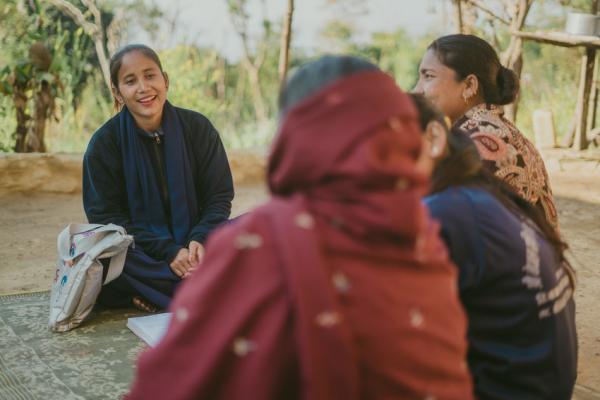
Strengthening community resilience
Secondly, at the community level Sisters for Sisters is working hard through our network of nearly 400 Community Volunteers. We have implemented community dialogues, assisted local people in raising concerns with their elected representatives, and assisted community organisations with complaint response mechanisms. A strong, inclusive community that listens to its members has the structures to respond to local needs and to mobilise in times of disaster or emergency. They also have the coordination to identify and respond to local risk.
Supporting individuals
Finally we help individuals: The backbone of Sisters for Sisters is an extensive mentoring programme where we partner up young marginalised school girls with mentors. These mentors help to keep the girls in school and maximise their educational outcomes. Both gain confidence and skills through mentoring. At the same time the quality of education is increased through a program of teacher training at the schools. Knowledge is power. By increasing the education of our girls we give them the power to get the information they need to understand and respond to the risks around them. We give them power and confidence to make their voices heard. They can make a difference to themselves, their family, their community and their nation.
We give [girls] power and confidence to make their voices heard. They can make a difference to themselves, their family, their community and their nation.
There can be no doubt that Nepalese people have learned to be highly resilient without anyone else’s help. That said, we all recognise more can be done. Sisters for Sisters believes in inclusion, because it is only when everyone has knowledge and a voice that we can properly understand the world around us. Resilience requires a clear understanding of that world so we can be prepared to avoid risks and be creative in our solutions when the inevitable emergency happens.
Find out more about our work in:
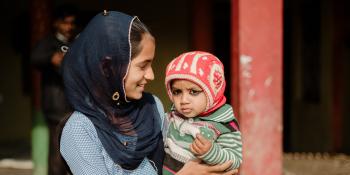
Nepal
We've worked in Nepal since 1964, building healthy communities, strengthening inclusive education systems, and developing community resilience.
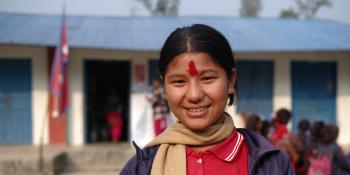
Sisters for Sisters' Education
Supporting vulnerable girls to succeed in school – and beyond.
